Dr. Dan Twelker has been the President of V/I for the past two years, the majority of which has been dominated by a world under coronavirus peril. As he leaves his post, we asked him to reflect his time in his leadership as President during such a unique and difficult time. Dr. Twelker continues to serve on the V/I Board for another 2 years as Immediate Past President, providing guidance, perspective and advice to the next President, Dr. Michael Ciszek (who we will interview next month)
Dr. Twelker received his Doctor of Optometry from the University of California, Berkeley College of Optometry in 1992. He worked in private practice for several years before returning to obtain his Ph.D. in Vision Science from The University of California, Berkeley. Since 2002, he has been on the faculty of the University of Arizona Department of Ophthalmology and Vision Science where he is an Associate Clinical Professor. He was the Site Principal Investigator for the Collaborative Longitudinal Evaluation of Ethnicity and Refractive Error from 2002 through 2012, which looked at the effect of ethnicity on eye growth and the need for spectacle correction. He was elected President of the Arizona branch of VOSH in 2015 and continues to serve in that position. In the fall of 2015, Dr. Twelker took leave of his position in Arizona to teach optometry at the Masinde Muliro University of Science and Technology in Western Kenya. In 2016, Dr. Twelker was elected to the Board of Directors for VOSH International, with his main emphasis being to support and sustain optometry education efforts in developing countries such as Malawi, Kenya, and Mexico.
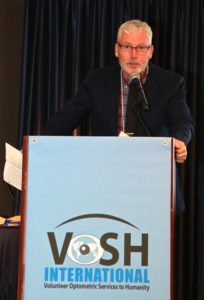
“I have an incredible amount of gratitude toward VOSH/International and all of the leaders and volunteer members around the world. I’d love to continue teaching about vision and eye care development, and learn about what other countries, cultures, and individuals have to teach me.“
Since the inception of your presidency two years ago, you have emphasized sustainability and education as major goals of your VOSH presidency. Can you explain what you mean by that and what progress you have made towards achieving those goals?
Name a developing country, any country. How is the country and its people served by a short-term eye clinic, and by short-term clinic I mean a 3-day, or 5-day, or even 2-week clinic? The answer is that the country is not served well by a short-term, direct eye care clinic because that is not what the country needs. The country needs long-term, year around, day-in-and-day-out quality, affordable eye care to serve its population. The country needs well-trained, licensed optometrists and ophthalmologists.
Fortunately, it only takes a pivot, an easily attainable shift for a VOSH or SVOSH chapter to contribute to that goal. We need to connect to and support the profession of optometry through optometry schools throughout the world. We have new international VOSH and SVOSH chapters in Mexico, El Salvador, the Dominican Republic, Haiti, Bolivia, and Nigeria, for example. Our more well developed chapters in the US and Canada must connect to and support the education of students through education, equipment, and teaching in our clinics. A good example is that annual VOSH Arizona clinic now invites and trains students from optometry schools in Sinaloa, Aguascalientes, and Durango.
We can see the progress in the amount of equipment shipped to the UTESA School of Optometry in the Dominic Republic, for example, in the quantity and quality of continuing education in our meetings, and the ever-growing list of international VOSH and SVOSH chapters.
A few months into your Presidency, the world shut down due to the Coronavirus. How did that effect the way you worked as VOSH president leading the chapters, committees and board members and interacting with other organizations with which VOSH collaborates? What did you learn from this unusual presidency?
Prior to the pandemic, our communication was mostly through e-mail and telephone conference calls. When the pandemic hit we moved our executive committee meetings, Board of Directors meetings, and committee work to Zoom. We moved the midyear and annual meetings to Zoom and greatly increased the quality and quantity of continuing education, available not only to our US and Canada chapters but to all VOSH and SVOSH Chapters. This was technology that was available prior to the pandemic but was underutilized. VOSH/International quickly adopted this important and groundbreaking technology to improve communication and educational efforts.
The thing about a pandemic, as the name implies, it is affects us all. We could see the pandemic moving from its origin to Italy, Spain, then Seattle, New York City and eventually to affect all US communities and countries around the world. Early on I thought maybe Arizona would be spared the worst of it, but at one point the surging rate of coronavirus infection in Arizona was as bad as anywhere in the world. In the early days, as it is today, it was important to protect lives which is why we asked our chapters to shut down clinics and avoid international travel.
Now, with a coronavirus vaccine available widely in the US we can safely complete domestic clinics using universal precautions. We can work with international schools of optometry, following their safety protocols our published guidelines, to consider international clinics once again.
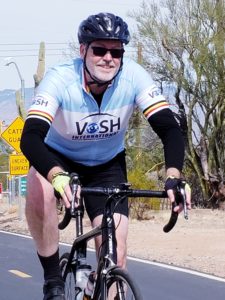
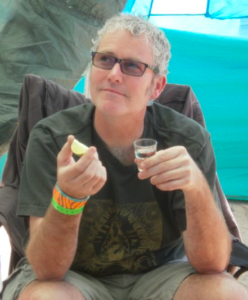
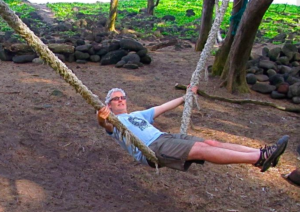
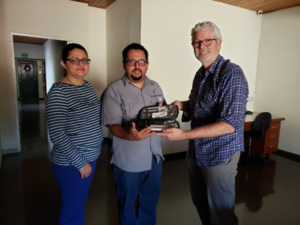
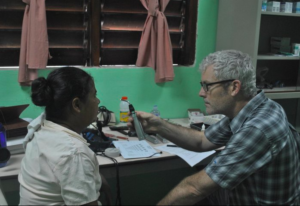
You will now be in the role of Immediate Past President and continue to serve on the Board of Directors for 2 years. What do you see as your role going forward?
As immediate Past President it is important for me to step aside and let new leadership lead. Having said that, sometimes a past president can provide important historical context or experienced guidance. I’ll continue my work in VOSH as an Ambassador and right now I am planning a visit to the UTESA School of Optometry in the Dominican Republic.
What have you learned about yourself through your role as VOSH/International President?
I learned about the importance of listening to the point of view of others and working as a team. Yes, occasionally a president needs to make a final decision, but only after listening carefully to the executive committee, our Executive Director, and our member volunteers.
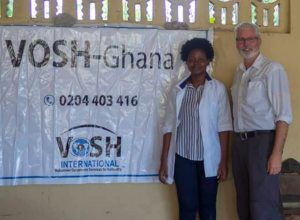
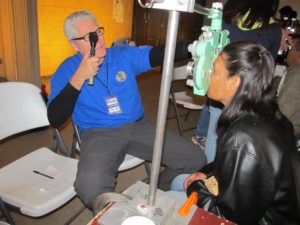
What do you see as the future path of VOSH? In the next 5 years? 10 years?
VOSH/International is already on the right path. We simply need to continue doing what we are doing and amplify our efforts. We need to move into supporting optometry legislation in developing countries to further solidify optometry as a profession. This, in the end, is how to best serve the eye care needs of the people of developing countries.
What advice would you give to Dr. Michael Ciszek, the incoming VOSH president?
Just like any incoming president, just like I was a couple years ago, an incoming president wonders if they will have the time and skills to complete the duties of the president. I have been working with Dr. Ciszek for years and have seen his remarkable skills as an organizer and communicator, especially in the development of SVOSH chapters and forums. My only advice would be to move forward with confidence and with a listening ear.
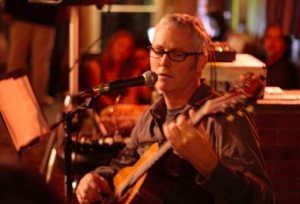
What will you do now that so much time not taken up with VOSH?
Well, this last weekend camping with friends I was brushing up on my beer drinking and cornhole game skills. I see this as a worthy endeavor. But seriously, I have been busy writing PowerPoint presentations for my VOSH Ambassador visit to the Dominican Republic. I see myself continuing do to short term eye care development visits to schools of optometry, and who knows, maybe over time I’ll consider another VOSH Corps faculty placement.
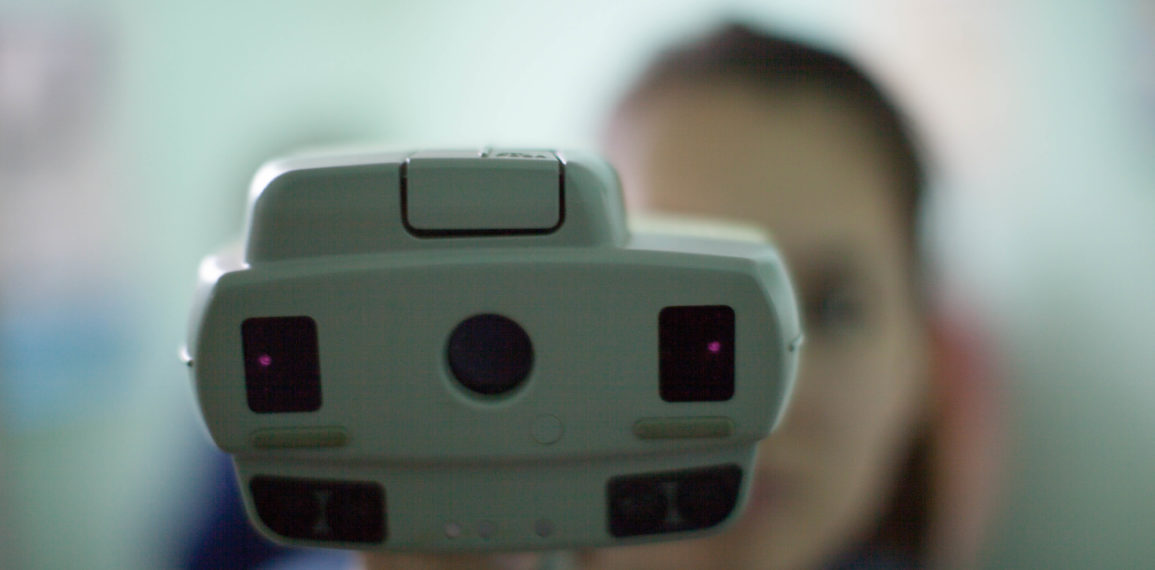

One Comment